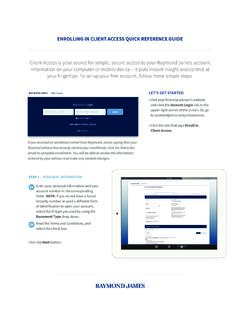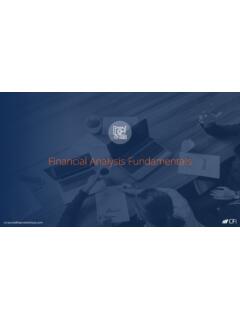Transcription of INTRODUCING THE FUNDAMENTALS OF FINANCIAL …
1 A guide to getting started toward a personal FINANCIAL THE FUNDAMENTALS OF FINANCIAL PLANNING2 RAYMOND JAMES: THE PIONEER OF FINANCIAL PLANNINGBack in 1962, when other firms were focused on buying and selling securities, our founder, Bob James, realized there should be more to a FINANCIAL services firm than just making investment transactions. He advocated a more thoughtful and deliberate approach to helping clients manage a wide range of matters that impact their lives. So, Bob made his vision a reality by creating a different kind of FINANCIAL services firm one that focused on client goals rather than sales quotas.
2 Today, Raymond James continues to steadfastly pursue Bob James vision. Everything we do is unflinchingly client-focused. Our unique culture of independence gives our advisors the complete freedom to offer objective, unbiased advice, so they can meticulously tailor a long-term plan based solely on a client s well-being and specific goals. Following in Bob s footsteps, your Raymond James advisor is able to give you the close, personal attention you need to help you make the right decisions for your situation and feel confident you have. That s because he or she has access to comprehensive support and a full range of resources from a global and yet highly personal FINANCIAL services firm.
3 At Raymond James, we view creating a FINANCIAL plan as an opportunity to get to know you personally. We want to celebrate your accomplishments, your vision and your commitment to creating a tailored plan for your future. It s a positive step toward FINANCIAL independence, and we want to be with you on that journey every step of the Bob James founds Robert A. James THE FUNDAMENTALS OF FINANCIAL PLANNINGWHY YOU NEED A FINANCIAL PLANLife is full of competing priorities some you plan for and some you don t. You probably have an idea of the things you want to do that will require money. Things like buying a house, having children, paying for their educations and weddings, and having enough money for a comfortable retirement.
4 But unexpected expenses like a broken-down car or hospital bill can strain anyone s finances. A FINANCIAL plan can put you in control so you stay on track regardless of what life throws at you saving and investing in the types of FINANCIAL vehicles that are specially designed for your with a FINANCIAL advisor can help you build a foundation so that life doesn t take you or at least your finances by surprise. A FINANCIAL advisor can advise you when there are changes in the markets, tax legislation or the economy, and can help you adjust accordingly. An advisor you trust, and a FINANCIAL plan you create together, will help guide you through the ups and downs to stay on track toward your IS IMPORTANT TO MATCH YOUR GOALS WITH APPROPRIATE PLANNING STRATEGIES AND INVESTMENT GOALSTIME FRAMEPLANNING STRATEGIES AND VEHICLESS aving for a weddingShort-termYou may consider a savings account or other low-risk for a down payment for a homeShort-to-mid termMore conservative fixed interest rate accounts with appropriate maturities may be the best to fund collegeMid-to-long termDepending on your child s age, slightly more risky investments may be appropriate to provide greater growth potential.
5 Tax-advantaged savings vehicles are also available when saving for education for retirementLong-termYour portfolio has more time to weather the ups and downs of the markets, making riskier investments more suitable. Employer defined contribution plans and other tax-deferred accounts provide significant advantages when saving for retirement incomeLong-termA structured income plan and balanced investment portfolio to help make sure you don t spend money too fast or take too much risk over the course of your retirement is essential. Disciplined withdrawal strategies and guaranteed income sources can assist with wealth/ estate planningLong-termAt this phase of life, planning for the orderly distribution of your estate to heirs and minimizing tax burdens by taking advantage of estate planning strategies will be a high FINANCIAL PLANNING PROCESSHOW A DISCIPLINED ADVISORY PROCESS CAN HELP YOU DEVELOP A FINANCIAL PLANAt Raymond James, we emphasize the importance of counseling, identifying your needs and concerns, and building a customized FINANCIAL plan designed to meet your specific objectives.
6 Developing your plan requires a solid understanding of your goals, investment experience, risk tolerance and much advisor can help break down the FINANCIAL planning process into the following steps: 3 INTRODUCING THE FUNDAMENTALS OF FINANCIAL PLANNINGU nderstand your needs Your FINANCIAL advisor typically begins by getting to know you and your family while gathering information about your current circumstances, your future goals, your concerns and your aspirations. During this phase, too, you and your advisor can discuss the strategies and services available to help solve the specific FINANCIAL challenges you face. Design a comprehensive plan Depending on your circumstances, your plan may focus on a single objective or a more complex strategy .
7 Your plan could be as singular as saving for retirement or a child s education, monetizing a concentrated equity position, or establishing a trust to benefit a child with special needs. But, perhaps, you may require a complex strategy that includes help with positioning and selling your business, then deploying the proceeds, together with other investable assets, to deliver the income you need to retire comfortably. Or you may be in need of multiple solutions: not only selling your business and developing an effective plan for retirement, but establishing a charitable trust to fund your philanthropic desires. Implement the plan In this phase, the planning is put into motion while collaborating with other relevant professionals as needed whether Raymond James specialists or your current attorney or CPA.
8 The plan is based on your goals uncovered in previous steps of the advisory process and factors in your investment horizon, as well as the types and levels of risk that you can afford and with which you re comfortable. Manage the plan once it s in place FINANCIAL planning is an ongoing process in which it s essential to monitor the progress of your investments within the context of your goals and periodically review all relevant information. It may become necessary to adjust the particular components of your plan in light of changing circumstances and evolving objectives. Should economic and FINANCIAL circumstances warrant, your advisor may also recommend tactical changes to your portfolio while still adhering to your long-term PLANNING STAGESLife is a long journey.
9 Each new stage presents both FINANCIAL challenges and opportunities. The key is to identify your needs, objectives and resources and understand what to expect during each phase of your life. The following steps can help guide you through this process as you develop, tweak and monitor a FINANCIAL plan throughout your THE FOUNDATIONIn order to lay the foundation for your FINANCIAL future, you ll need to balance your priorities and create a plan. The earlier you start, the better your chance of building a solid FINANCIAL foundation that can grow with you and support your near-term needs and long-term goals. Over time, small but disciplined contributions to an investment account can help you meet your goals plus establish a lifetime habit of it s never too late to start.
10 You may have been saving and investing for years without a formal strategy , but there s no time like the present to pull it all together into a structured FINANCIAL plan. SavingIt s important to maintain an appropriate balance between spending and saving. Create a budget in which you spend less than you earn. Identify your more immediate needs, such as housing and utilities, and prioritize your wants, such as taking a vacation, buying a car or starting a family. Allocate a portion of your budget toward both short- and long-term goals. Equally important is managing and eliminating debt. If you have debt, you should develop a plan to systematically pay it down and avoid accruing new cashYou should always keep some portion of your money as cash or cash alternatives in liquid investments like savings, checking and money market accounts.












